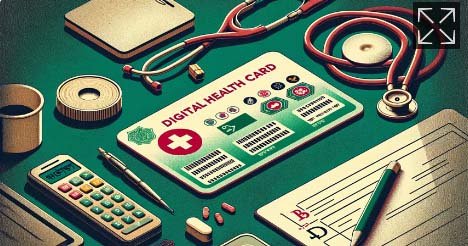Health Desk: Each patient will be issued a digital health card, consolidating information on doctor’s appointments, health conditions, and tests. Patients will carry these cards to hospitals, instead of physical prescriptions and tests, allowing doctors seamless access to their medical details.
The government has taken an initiative to introduce digital health cards for all citizens, in a bid to eradicate the need of preserving physical prescription and test files by creating a unified digital database.
The Directorate General of Health Services (DGHS) has taken the initiative aimed at streamlining patient information management through a comprehensive digital database. Under this initiative, each patient will be issued a digital health card, consolidating information on doctor’s appointments, health conditions, and tests. Patients will carry these cards to hospitals, instead of physical prescriptions and tests, allowing doctors seamless access to their medical details.
Health cards can be obtained by registering online in a website soon to be launched by DGHS. There will also be an offline option of registration from government or private hospitals with NID or birth certificates. The whole process will be free of costs. The ‘Health ID Number’ provided to the patients will be used to store health related data throughout the patient’s life.
The Medical Information Services (MIS) of DGHS is working to implement this project. The health card will be intricately linked to an individual’s NID or birth certificate, forming a comprehensive health profile.
Professor Dr. Md. Shahadat Hossain, Director (MIS) of DGHS said, “The pilot project of digital health cards is expected to begin by January. There will be a unique profile with medical records of an individual against their designated health IDs.”
“For example, if a patient comes to Dhaka from another upazila for medical services, they would just have to provide their health card with the ID number and doctors will be able to see the necessary details. After linking all the government hospitals with health card facilities, we will also bring the private hospitals into the database,” he said.
“However, the whole process might take 5 to 7 years to be properly set in motion,” he added
Dr. Shahadat also mentioned that the DGHS has signed agreements with the Election Commission for NID related information and the Registrar General’s office for birth registration related information in order to create a national level database.
Government hospitals have already started automation for this project. The pilot project of health cards will commence in a handful of hospitals at first beginning with Gopalganj’s Muksudpur and Manikganj’s Singair Upazila. Over time, the project will extend to various government hospitals nationwide.
Private hospitals, which are using their own automation software, can connect their software with ‘Shared Health Records’. Private hospitals that do not have their own software and do not want to develop a new software, a software will be provided on the website of the Department of Health to connect them.
Dr. Rayhan Islam Shovon, the Health and Family Planning Officer for Muksudpur Upazila Health Complex in Gopalganj, expressed, “We are actively advocating for the health card initiative within our hospital premises. We urge individuals to bring along a copy of their NID or birth certificate when visiting the health complex.”

